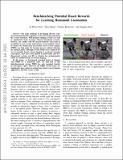| dc.contributor.author | Jeon, Se Hwan | |
| dc.contributor.author | Heim, Steve | |
| dc.contributor.author | Khazoom, Charles | |
| dc.contributor.author | Kim, Sangbae | |
| dc.date.accessioned | 2024-02-28T18:54:47Z | |
| dc.date.available | 2024-02-28T18:54:47Z | |
| dc.date.issued | 2023-05-29 | |
| dc.identifier.uri | https://hdl.handle.net/1721.1/153602 | |
| dc.description | 2023 IEEE International Conference on Robotics and Automation (ICRA 2023) May 29 - June 2, 2023. London, UK | en_US |
| dc.description.abstract | The main challenge in developing effective reinforcement learning (RL) pipelines is often the design and tuning the reward functions. Well-designed shaping reward can lead to significantly faster learning. Naively formulated rewards, however, can conflict with the desired behavior and result in overfitting or even erratic performance if not properly tuned. In theory, the broad class of potential based reward shaping (PBRS) can help guide the learning process without affecting the optimal policy. Although several studies have explored the use of potential based reward shaping to accelerate learning convergence, most have been limited to grid-worlds and low-dimensional systems, and RL in robotics has predominantly relied on standard forms of reward shaping. In this paper, we benchmark standard forms of shaping with PBRS for a humanoid robot. We find that in this high-dimensional system, PBRS has only marginal benefits in convergence speed. However, the PBRS reward terms are significantly more robust to scaling than typical reward shaping approaches, and thus easier to tune. | en_US |
| dc.language.iso | en | |
| dc.publisher | IEEE | en_US |
| dc.relation.isversionof | 10.1109/icra48891.2023.10160885 | en_US |
| dc.rights | Creative Commons Attribution-Noncommercial-Share Alike | en_US |
| dc.rights.uri | http://creativecommons.org/licenses/by-nc-sa/4.0/ | en_US |
| dc.source | arxiv | en_US |
| dc.title | Benchmarking Potential Based Rewards for Learning Humanoid Locomotion | en_US |
| dc.type | Article | en_US |
| dc.identifier.citation | Jeon, Se Hwan, Heim, Steve, Khazoom, Charles and Kim, Sangbae. 2023. "Benchmarking Potential Based Rewards for Learning Humanoid Locomotion." 2023 IEEE International Conference on Robotics and Automation (ICRA). | |
| dc.contributor.department | Massachusetts Institute of Technology. Department of Mechanical Engineering | |
| dc.relation.journal | 2023 IEEE International Conference on Robotics and Automation (ICRA) | en_US |
| dc.eprint.version | Author's final manuscript | en_US |
| dc.type.uri | http://purl.org/eprint/type/ConferencePaper | en_US |
| eprint.status | http://purl.org/eprint/status/NonPeerReviewed | en_US |
| dc.date.updated | 2024-02-28T17:09:50Z | |
| dspace.orderedauthors | Jeon, SH; Heim, S; Khazoom, C; Kim, S | en_US |
| dspace.date.submission | 2024-02-28T17:09:52Z | |
| mit.license | OPEN_ACCESS_POLICY | |
| mit.metadata.status | Authority Work and Publication Information Needed | en_US |
